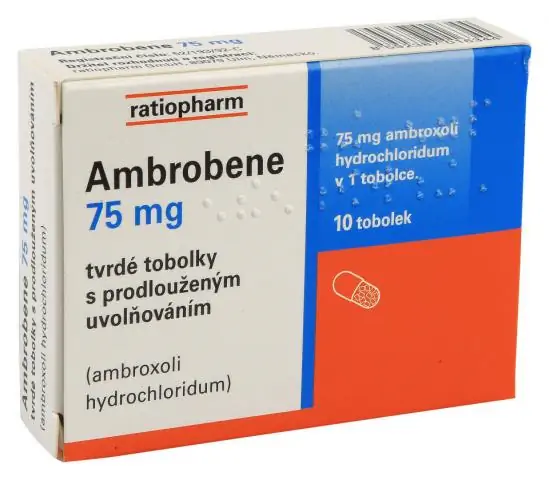- Author Rachel Wainwright wainwright@abchealthonline.com.
- Public 2023-12-15 07:39.
- Last modified 2025-11-02 20:14.
Codeine
Instructions for use:
- 1. Pharmacological action
- 2. Indications for use
- 3. Instructions for use
- 4. Side effects
- 5. Contraindications to use
- 6. Additional information

Codeine is an antitussive drug with analgesic and mild narcotic effects.
Pharmacological action of Codeine
Codeine is similar in nature to morphine, but has less pronounced analgesic properties, and on the other hand, to a lesser extent inhibits the activity of the digestive tract and inhibits respiration.
The use of codeine for coughing is due to its ability to suppress the cough center and reduce its excitability. This drug affects the emotional perception of pain, which allows it to be used as a component of analgesic drugs.
High doses of codeine can be euphoric and addictive when used regularly.
The hypnotic effect of codeine is significantly less than that of opium and morphine. After oral administration, the analgesic effect is observed after 30-60 minutes, and after subcutaneous or intramuscular administration - after 10-45 minutes. The maximum effect of codeine is achieved within 1-2 hours after oral administration and 0.5-1 hours after intramuscular administration.
Codeine for a cough is effective within 4-6 hours, and as an analgesic - 4 hours.
Preparations containing codeine: Codelmixt, Codterpin, Codeterp, Terpinkod, Sedal-M, Codelak, Kodesan, Solpadein, Sedalgin, Kaffetin, Kofeks, Nurofen plus, Pentalgin.
Codeine phosphate has a similar nature of action and indications for use. This drug contains about 80% codeine and is considered less toxic. Codeine phosphate is allowed for use in children of the younger age group, for adults this drug is prescribed in the same doses as codeine.
Indications for use
Codeine is prescribed for a cough of an unproductive nature with pulmonary emphysema, bronchitis, bronchopneumonia.
In addition, codeine and codeine phosphate are used to eliminate mild and moderate pain syndrome, in combination with non-narcotic analgesics - for headaches, neuralgia. Diarrhea is also an indication for the use of codeine.
Instructions for the use of Codeine

For adults, it is recommended to take codeine for coughing 4 times a day, 10-20 mg, with the same frequency of 30 mg doses, the drug is prescribed for diarrhea. To eliminate pain syndrome, codeine should be taken every 3-6 hours, 15-60 mg. The maximum daily dose of codeine for adults should not exceed 120 mg.
The daily dose of codeine for children with pain and diarrhea is 0.5 mg / kg, the frequency of doses is 4 times, if necessary, the number of doses can be increased up to 6 times to eliminate pain syndrome.
Codeine for cough is not recommended for children under two years of age, however, codeine phosphate in a dose of 2-10 mg at a time can be prescribed for children over 6 months.
Children 2-5 years old from cough are recommended 1 mg / kg per day, the dose is divided into 4 doses. It is also possible another regimen, according to which every 4-6 hours (no more than 4 times a day) children are prescribed the following doses of codeine: over 2 years old, whose body weight exceeds 12 kg - 3 mg each; over 3 years old, with a body weight of more than 14 kg - 3.5 mg each; over 4 years old - 4 mg; over 5 years old - 4.5 mg each; 6-12 years old - 5-10 mg.
Side effects
Preparations containing codeine can cause such undesirable effects as:
- constipation, nausea, vomiting, anorexia, dry mouth, spasms in the digestive tract, paralytic intestinal obstruction;
- drowsiness, fatigue, headache, confusion, dizziness, nervousness, depression, convulsions, involuntary muscle twitching, ringing in the ears;
- arrhythmias, decrease or increase in blood pressure;
- oppression of the respiratory center, atelectasis (a condition in which all or part of the lung collapses as a result of airlessness);
- spasms of the ureters, decreased urine volume;
- allergic skin reactions, bronchospasm, laryngospasm, facial edema, laryngeal edema;
- sweating, discomfort, weight gain.
Codeine causes drug dependence and withdrawal symptoms.
Contraindications to the use of Codeine
Codeine and codeine phosphate are not prescribed for:
- toxic dyspepsia (disturbance in the activity of the stomach);
- diarrhea against the background of pseudomembranous colitis (a disease of the colon, provoked by prolonged use of antibiotics), which was caused by lincosamides, cephalosporins, penicillins;
- acute depression of the respiratory center;
- hypersensitivity.
Codeine should be taken with caution for coughing and for pain relief when:
- an attack of bronchial asthma;
- acute abdominal pain of unknown origin;
- convulsions;
- arrhythmias;
- chronic obstructive pulmonary disease;
- alcoholism;
- drug dependence;
- emotional lability;
- gallstone disease;
- brain trauma;
- hepatic or renal failure;
- intracranial hypertension;
- hyperplasia of the prostate;
- severe inflammatory bowel disease.
The decision on the appropriateness of the use of codeine by pregnant women, breastfeeding women, elderly patients and children should be made by the attending physician.
Additional Information
Codeine will be usable for 5 years if stored in a dark and dry place.
Information about the drug is generalized, provided for informational purposes only and does not replace the official instructions. Self-medication is hazardous to health!






